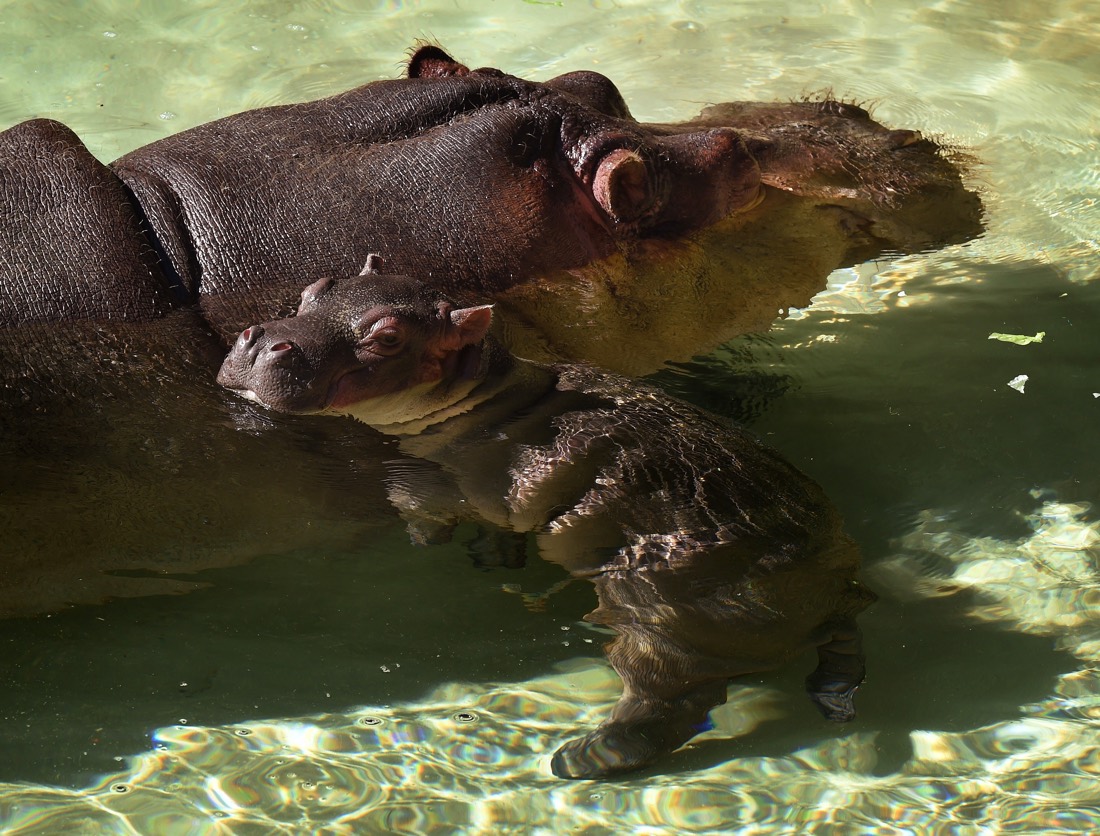Man Who Slapped Hippo's Butt at LA Zoo Is Still at Large

Police in Los Angeles are on the lookout for a man who was recently captured on video trespassing at the LA Zoo and getting dangerously hands-on with a hippopotamus.
In the footage, posted to Twitter on Aug. 7, the unidentified man is seen climbing over a railing into a restricted area near the zoo's hippo enclosure. He then leans close to the two animals standing by the wall — a mother and daughter pair named Mara and Rosie — and smacks 4-year-old Rosie on her bottom, the Los Angeles Times reported.
After the slap, Rosie flinches, and Mara appears startled; the assailant jumps back over the railing and flees. The incident came to the attention of zoo administrators after the video was widely shared on social media last week. And although police received a trespassing report, no official charges have been filed, LAPD representatives told ABC News. [Photos: World's Cutest Baby Wild Animals]
Even so, the butt slap was a dangerous move, April Spurlock, a representative of the L.A. Zoo, told Live Science in an email.
"Any unauthorized interaction with an animal is unsafe for the animal and potentially unsafe for the patron," Spurlock said. "It is never okay to take an animal by surprise and physically make contact with an animal in a way that could be harmful."
Unauthorized entry into animal enclosures at the zoo is prohibited by state law, and may be punishable as a misdemeanor or an infraction, Spurlock added.
Viewed more than 440,000 times on Twitter, the footage shows the man slowly reaching down to deliver a swift slap to Rosie's rear, after which he leaps over the rail and turns to face the camera, seemingly raising his arms victoriously as he jogs away.
Get the world’s most fascinating discoveries delivered straight to your inbox.
"Hippos do have thick skin, but it is also very sensitive," Spurlock told Live Science. The slap would likely have stung temporarily, and Rosie has exhibited no behavioral changes since then, Spurlock said. However, actions such as this can undermine the delicate trust that zoo professionals work hard to establish with the animals that they care for, she explained.
While hippos may appear amusingly lumbering and awkward, they have sharp tusks and can move very quickly; they are considered to be one of the most dangerous animals in Africa, Michelle Curley, a representative of the Cincinnati Zoo, told Live Science. The Cincinnati Zoo's resident hippo, an endearing 1-year-old named Fiona, weighs about 865 lbs. (392 kilograms) and is still growing. And even though she has been around people since she was born, her keepers still observe strict safety rules during their interactions with her, Curley said.
At the LA Zoo, Mara gave birth to Rosie in 2014, and Rosie was the first hippo calf born at the zoo in 26 years, officials said in a statement that year. At 4 years old, Rosie is now just about fully grown — and an adult female hippo can weigh as much as 3,000 lbs. (1,400 kg).
Special tours at the LA Zoo offer a behind-the-scenes look at the habitat and habits of hippos and other wild animals. However, these encounters take place under the close supervision of zoo officials and animal caregivers, and guests are never permitted to enter animals' enclosures on their own, zoo officials said in the statement.
Mara and Rosie were unharmed by the experience. Nevertheless, after zoo officials found out about the video, "No Trespassing" signs were installed near the hippos to deter copycat rule breakers — for the protection of visitors as much as for the animals, officials said in a statement.
"It is a privilege to observe these rare and endangered species, but they are still wild animals and their space must be respected at all times," they said.
Original article on Live Science.

Mindy Weisberger is a science journalist and author of "Rise of the Zombie Bugs: The Surprising Science of Parasitic Mind-Control" (Hopkins Press). She formerly edited for Scholastic and was a channel editor and senior writer for Live Science. She has reported on general science, covering climate change, paleontology, biology and space. Mindy studied film at Columbia University; prior to LS, she produced, wrote and directed media for the American Museum of Natural History in NYC. Her videos about dinosaurs, astrophysics, biodiversity and evolution appear in museums and science centers worldwide, earning awards such as the CINE Golden Eagle and the Communicator Award of Excellence. Her writing has also appeared in Scientific American, The Washington Post, How It Works Magazine and CNN.


